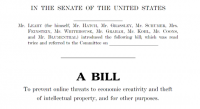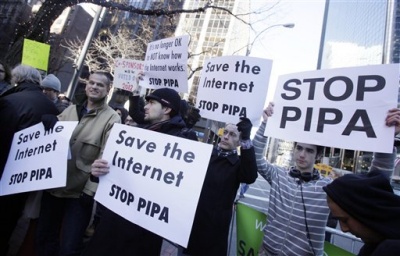Difference between revisions of "Protect IP Act"
m (added poli cat) |
|||
| Line 32: | Line 32: | ||
[[Category:Information Ethics]] | [[Category:Information Ethics]] | ||
[[Category:Virtual Environments, Concerns, & Issues]] | [[Category:Virtual Environments, Concerns, & Issues]] | ||
| + | [[Category: Politics]] | ||
([[Topics|back to index]]) | ([[Topics|back to index]]) | ||
Revision as of 22:45, 5 December 2012
The Protect IP Act, or PIPA is the US Senate's version of the Stop Online Piracy Act (SOPA) in the US House. According to the bill, the purpose of the Protect IP Act is to "To prevent online threats to economic creativity and theft of intellectual property, and for other purposes [1]. The bill would expand both public and private enforcement of online copyright and trademark infringement [2].Contents
Overview
Basically, the Protect IP Act is a bill of legislation passed by the United States Senate grants the US attorney general greater accessibility to regulate web sites featuring pirated content and counterfeit goods. [3] By restricting access to websites with counterfeit products or illegal content, the government hopes to promote integrity and ethical business practices by websites on the internet. This bill also allows the United States Department of Justice greater legal access to consider the ramifications of such illicit activities and punish websites participating in them. Theoretically, this legislation will help prevent the sale of counterfeit goods online, however in reality there were unforeseen consequences and issues we are now presently taking into consideration. [4]
Controversy and Issues with the Protect IP Act
Filibuster Plan
While Internet Rights groups rally against the Protect IP Act, the Act also faces opposition from within the Senate. Senator Ron Wyden, an Oregon Democrat, has discussed a plan for a filibuster when the bill comes up in the Senate, likely in early December, 2011[5]. Senator Wyden is working with a iberal activist group called Demand Progress to gather signatures in opposition to the bill[5]. Wyden plans to read each for the names of those who signed during the filibuster, with over 50,000 names in the first 24 hours coming in after Wyden's request[5]. As of December 8 2011, over 985,000 signatures have been collected on the internet site Avaaz [6].
Difference between SOPA and PIPA
SOPA and PIPA are, essentially, two versions of the same anti-piracy bill. Both are intended to curb online piracy but with different provisions and specific wording in the bill.
To differentiate from SOPA, PIPA does not have a provision that requires search engines to remove “foreign infringing sites” from their indexes. But it does require more court intervention to take down a site. The only downside is that it penalizes a copyright holder for making a false claim of infringement. In other words, a content creator can be proved wrong regarding an infringing site and the site can do nothing about its costs incurred in the litigation process.[7] The key difference is that PIPA does not threaten a large number of legal and innovative online services, including Twitter, Facebook, and YouTube. PIPA also has a greater chance of passing because it has not been in the spotlight and has progressed farther. PIPA has already passed out of committee and is primed for consideration by the full Senate, making it much farther along in the legislative process than the House’s SOPA.[8]
See Also
References & Citations
- ↑ http://leahy.senate.gov/imo/media/doc/BillText-PROTECTIPAct.pdf
- ↑ http://news.cnet.com/8301-13578_3-20093304-38/five-essential-changes-to-protect-ip-act/
- ↑ McDermott, E. "Managing Intellectual Property." London: 1 May 2011. Web. 30 November 2011.
- ↑ 4.0 4.1 4.2 Ballard, M. "The Protect IP Act: A Powerful Tool, A Powerful Controversy." Mondaq Business Briefing. 22 June 2011. Web. 30 November 2011.
- ↑ 5.0 5.1 5.2 http://www.pcworld.com/businesscenter/article/244622/senator_threatens_filibuster_of_protect_ip_act_as_vote_nears.html
- ↑ http://www.avaaz.org/en/save_the_internet/ Save The Internet
- ↑ http://socialmediacollective.org/2012/01/17/whats-the-difference-between-sopa-and-pipa
- ↑ http://socialmediacollective.org/2012/01/17/whats-the-difference-between-sopa-and-pipa

